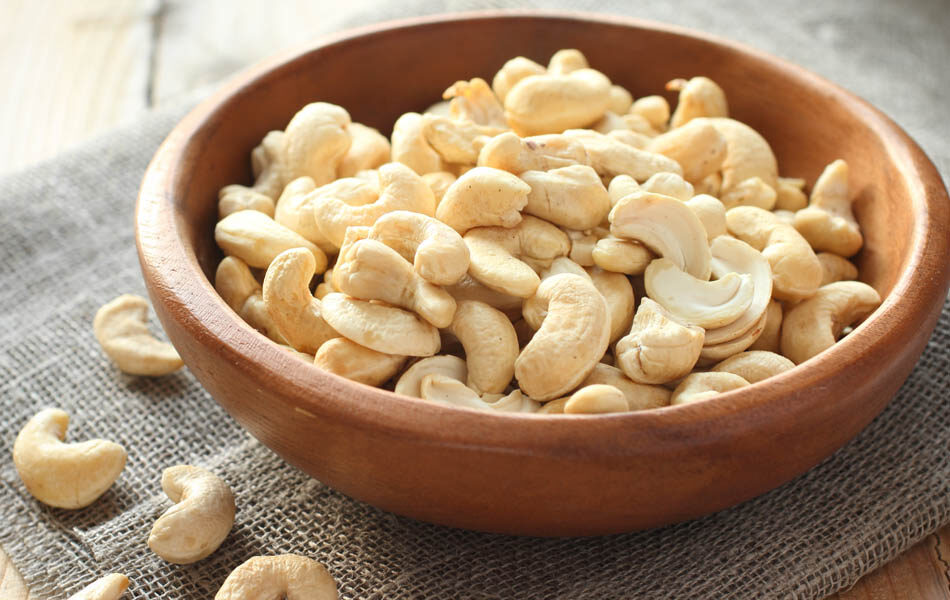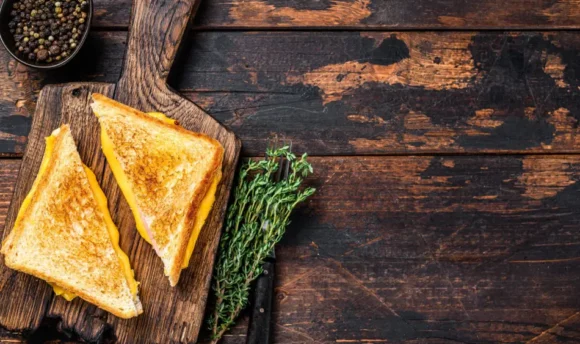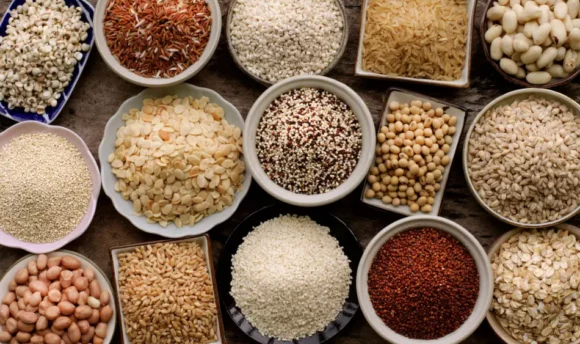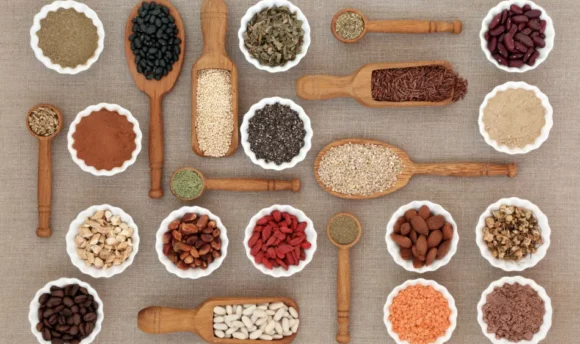Cashews 101: Are They Healthy? Benefits and Nutrition
Cashew nuts are believed to be a nutrient-dense food. They contain lots of important minerals, but are they actually healthy? We go into detail about the health benefits of cashews, their nutritional content, and a low-calorie recipe that can spice up your current diet.

Cashews have been linked to many health benefits.
You can eat cashews raw or cooked to improve your overall well-being. This is all down to the important nutrients like fiber, protein, and vitamin B6. But, despite their goodness, people who are following a diet might question whether these nuts are healthy.
Brands selling roasted cashews usually throw in a bunch of oils and salts to enhance the taste. This can put a negative label on cashew nuts. Learning about the nutritional content of truly raw cashews can help you understand why they’re great for a diet.
In this article, you’ll discover the health benefits of raw cashews.
What Are Cashews?
Cashews are a type of tree nut shaped like kidney beans with a hard outer shell. They are packed with nutrients like dietary fiber, protein, and healthy fats. You can find cashew nuts on their respective trees in many warm countries.
Some people snack on cashew nuts throughout the day for a boost of energy. You could even mix them in low-calorie pasta recipes or green salads. These nuts have a rich nutty taste when eaten raw and a sweet buttery flavor when cooked with desserts.
The average daily consumption of cashews is 15–30. Eating this amount can fuel your body with important nutrients without adding to your overall fat percentage. Just remember to measure how much you eat and always buy raw ones at the store.
Are Cashew Nuts Healthy?
Yes, cashews are healthy nuts that can benefit most diets. They contain important nutrients like omega-3 fatty acids, magnesium, and vitamin B6. To stay healthy or lose weight, it’s important to eat nutrient-dense foods that are completely natural.
Studies have shown that eating any type of nut is great for your diet. You should incorporate more nuts into your meals when gaining health benefits. Since cashews contain unsaturated fats, they won’t contribute to weight gain or heart disease.
Raw cashews are also one of the best diabetes-friendly foods. This is because of the healthy fats and dietary fiber. One study found that those with diabetes had lower cholesterol and a decreased risk of blood pressure spikes after eating cashews.
10 Health Benefits of Cashews
Some people eat cashews just for the benefits. The high nutritional value makes them great for improving your physical health. If you aren’t convinced about eating nuts in your diet, read the list of benefits below to see just how nutritious cashews are.
#1 Strengthens your heart
Cashews are one of the best heart-friendly foods. They lower LDL “bad” cholesterol and boost the good cholesterol that cleans your blood. As you might guess, fewer fatty deposits in the bloodstream can decrease the risk of cardiovascular diseases.
Since magnesium is one of the main minerals in cashews, it also helps to maintain heart rhythm. This is because magnesium regulates nerve signals and muscle contractions. A study found that a lack of electrolyte minerals can cause arrhythmias in older adults.
#2 Protects the eyes
Not many people know that cashews protect your eyes from UV rays.
Lutein and zeaxanthin are two antioxidant pigments that reduce age-related macular degeneration (AMD) – a disease that can cause vision loss. Cashews contain high amounts of these pigments, making the nuts great for maintaining healthy eyes.
#3 Boosts skin health
Cashews are rich in copper and selenium – two minerals that maintain good levels of collagen. Your body needs collagen to prevent the skin from sagging too much. Some people enjoy eating cashews to gain radiant skin and delay the onset of wrinkles.
#4 Lowers bad cholesterol levels
Eating unroasted cashews can increase HDL cholesterol – the “good” cholesterol that removes fat from your bloodstream. Fiber-rich foods like cashews can absorb LDL “bad” cholesterol in the small intestine and prevent atherosclerosis from developing.
You should eat other foods that lower cholesterol. These comprise kidney beans, spinach, carrots, bell peppers, blackberries, walnuts, and pistachios. As you can see, consuming other nuts that contain unsaturated fatty acids can be great for heart health.
#5 Supports weight loss
Cashews contain lots of nutrients that can boost the fat-burning process.
Magnesium is one of those minerals that may support weight loss. A study found that consuming magnesium-rich foods will promote a faster metabolism and help your body burn more calories, leading to a lower body fat percentage over time.
People with a fast metabolism convert more food into energy rather than fat. The more energy you have, the greater your exercise performance will be. Aim to eat a handful of cashews every day to support the metabolism and burn more stubborn calories.
#6 Reduces blood sugar
Cashews are one of the best nuts for lowering blood sugar levels. This is because they don’t have saturated fats or sugar that increase glucose stores. Better blood sugar control is great for people with diabetes or those who need to strengthen their hearts.
#7 Regulates bowel movements
One portion of raw cashews holds enough fiber to support strong bowel health. Getting at least 25–30 grams of fiber a day can also prevent serious constipation. The dietary fiber present in cashews can regulate digestion and unclog your intestines.
#8 Great for brain health
Cashew nuts have monounsaturated and polyunsaturated fatty acids – good fats that are essential for your brain to stay healthy. They support memory functions, which can boost your concentration and help you feel more awake throughout the day.
Another great thing about cashews is that they reduce inflammation. Too much swelling in the brain can lead to persistent fatigue, muscle weakness, memory problems, and vision defects. Therefore, consuming cashews keeps your brain functioning properly.
#9 Boosts the immune system
Foods containing selenium are more likely to boost your immune system.
This mineral strengthens white blood cells and helps the body fight off infections. Since cashews are rich in selenium, you can eat some every day to gain immunity benefits. Selenium is also known to protect your cells from oxidative damage.
#10 Supports your bones
One nutrient you need for strong bones is calcium. Not getting enough calcium can increase the risk of developing osteoporosis. To keep your bones strong and healthy, eat cashews on your diet and try to make cashew milk for an extra calcium source.
Nutrition Facts of Cashews
There are plenty of vitamins and minerals in raw cashews. You can eat these tree nuts throughout the day to fuel your body with essential nutrients. Just take a look at the nutritional content table below to see how eating cashews are great for your health.
Nutritional value (per 100g)
| Calories/Nutrient (per 100g) | Amount |
| Calories (kcal) | 553 |
| Net Carbs (g) | 26.9 |
| Fiber (g) | 3.3 |
| Sugar (g) | 5.91 |
| Fats (Total) | 43.8 |
| Protein (g) | 18.2 |
| Vitamins and minerals | |
| Iron (mg) | 6.68 |
| Magnesium (mg) | 292 |
| Calcium (mg) | 37 |
Source: https://fdc.nal.usda.gov/fdc-app.html#/food-details/170904/nutrients
High in calories and fats
Cashews are one of the most high-calorie nuts you can eat. This might sound daring for people who want to lose stubborn weight, but cashews are still great for a balanced diet. You should limit how many cashews you have in one day to see noticeable results.
The same goes for the healthy fat content. Your body needs unsaturated fats to support cell function and keep everything functioning properly. Aim to eat raw nuts instead of roasted or salted cashews to avoid weight gain and damaging blood sugar spikes.
High in proteins
Getting enough protein is great for building muscle. Protein fuels your muscles and helps them to recover after strength training exercises. This nutrient also curbs any hunger cravings on a diet, making cashews great for your weight loss journey.
High in carbohydrates
Consuming 26.9 grams of carbohydrates may not appeal to everyone, but it’s important to note that these carbs won’t damage your health. You need unrefined carbs to provide the body with glucose and help it to sustain high energy levels throughout the day.
Just be aware that cashews aren’t suitable for anyone on the keto diet. This is due to ketosis – a metabolic state that occurs when you consume fewer carbs. For those who want to burn fat on this diet, opt for small amounts of almonds, pecans, and walnuts.
Rich in vitamins and minerals
The human body needs vitamins to boost immune responses and ensure bones function properly in the long term. Nutrient-dense foods like cashews contain a variety of vitamins and trace minerals, making them great for improving your overall health.
Here are some of the vitamins and minerals in cashews:
- Magnesium
- Zinc
- Phosphorus
- Vitamin B6
- Selenium
- Iron
- Potassium
- Copper
- Vitamin K
- Calcium
Healthy Recipe With Cashews
There are lots of delicious recipes you can make with cashews. You can use green veggies, lean meats, and whole grains to spice up your meals. Below is a low-calorie recipe that includes cashews, vegetables, and a healthy sauce to enhance the taste.
Ingredients
- 1 tbsp olive oil
- Diced chicken breast
- 2 cups broccoli
- 1 bell pepper
- 4 green onions
- 3 garlic cloves
- 1 cup sugar snap peas
- ½ cup carrots
- 1⁄3 cup raw cashews
- Pepper and salt (optional)
For the sauce:
- 2 tbsp honey
- 4 tbsp low-sodium soy sauce
- 1 tsp sesame oil
- 1 tbsp grated ginger (optional)
- 3 tbsp chicken broth
- 3 tbsp natural peanut butter
Directions
- Sprinkle the olive oil over your frying pan and add the diced chicken.
- You can season the chicken with salt and pepper during this stage.
- Once the chicken is browned after 4–5 minutes, transfer it to a plate and set aside.
- Add more olive oil to the pan and throw in broccoli, bell pepper, snap peas, and carrots.
- Cook these vegetables for 4–5 minutes or until they appear softened.
- To make the sauce, whisk together soy sauce, peanut butter, sesame oil, grated ginger, and honey. Mix in 2–3 tablespoons of chicken broth to get the consistency you desire.
- Add both the cooked chicken and veggies to the pan and sprinkle some garlic over the mixture. Once the garlic is soaked in, add your cashews and sauce. Make sure to consistently stir these ingredients until everything is coated and incorporated nicely.
- Finely cut some green onions and sprinkle them on top of your dish to serve.
Nutrition facts
| Calories | 246 |
| Protein | 5.7g |
| Fiber | 2.6g |
| Sugar | 8.8g |
| Fat | 10g |
| Carbs | 15.5g |
For more low-calorie meals, consider downloading the Keto Cycle app. You can discover 10,000+ healthy keto recipes that improve your long-term health. There are also personalized meals that cater to your food preferences, nut allergies, and diet.

- Proven scientific data
- Calorie tracker
- Customized meal plans and food prep
- 10,000+ easy-to-make keto recipes (including vegetarian options)
- Full workout schedule
- Motivational tips
FAQs
No, cashew nuts are not a fattening food because they fuel your body with important nutrients. They also lack saturated fats and added sugar, making them great for a balanced diet. A handful of these nuts per day is enough to maintain a healthy weight.
The glycemic index of cashew nuts is 20–25. People with diabetes can eat these nuts to prevent high blood sugar levels. Foods with a low glycemic index allow the body to digest it properly without triggering too much insulin or glucose in the bloodstream.
Yes, cashews are one of the best foods to eat for omega-3 fatty acids. Getting more omega-3’s in your balanced diet can prevent cardiovascular diseases, control rheumatoid arthritis, and protect your brain, so it’s worth eating more cashew nuts.
Salted cashews are not the best option for improving your health. They usually contain refined oils and high levels of sodium. If you want to lose weight or prevent heart disease, avoid salted or roasted cashews and stick with eating plain versions.
There’s a chance you can eat too many cashews throughout the day. It’s important to note that cashews may contain lots of calories. Plus, the high oxalate content may lead to kidney damage in some people, so keep this in mind when eating cashew nuts.
Yes, cashew nuts can lower LDL “bad” cholesterol levels. This reduces the risk of plaque buildup in your arteries, which often leads to heart disease. This food also promotes high HDL “good” cholesterol, leading to fewer fat lipids in your bloodstream.
Doctors may recommend you avoid foods with high oxalate levels. Some of these foods comprise cashews, almonds, spinach, potatoes, dates, peanuts, and pistachios. If you want to treat kidney stones, it’s better to avoid eating cashew nuts.
A Word From a Nutritionist
You don’t always need to eat plain cashews in your diet. Some people like to make cashew butter or cashew milk when pairing them with other healthy meals. Even cashew nut oil is great for cooking and may be a better alternative to refined oils.
Tree nuts, in general, are great for brain and heart health. Those who consume cashews are more likely to have lower blood pressure. Of course, less pressure in your arteries can prevent heart disease and even heart attacks when you get older.
Just be aware that certain people with kidney problems may have to limit cashews on their diets. This is because of the oxalate levels that stop kidneys from healing. Speak to your doctor about eating this food first to avoid more health complications.
Conclusion
So, are cashews good for you?
Eating cashews is great for improving your long-term health. Some people consume other nuts as well, like almonds, peanuts, walnuts, and pistachios. This is because nuts retain many important nutrients that decrease the risk of cardiovascular disease.
Consider making cashew butter and milk to maintain a healthy weight too.

- Proven scientific data
- Calorie tracker
- Customized meal plans and food prep
- 10,000+ easy-to-make keto recipes (including vegetarian options)
- Full workout schedule
- Motivational tips

















































 Select your language:
Select your language: 








